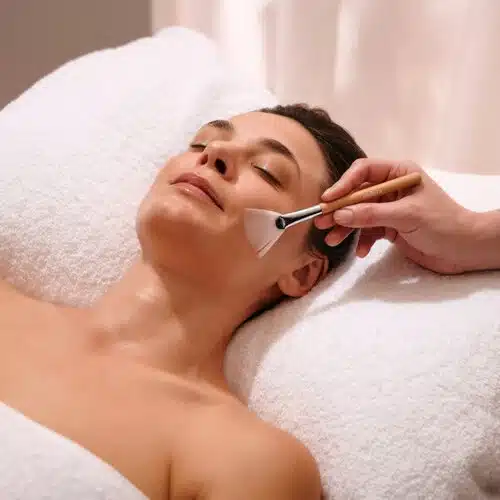With so many facials and treatments available it can be a process finding the right facial for you and your skin. And while your skin’s needs and concerns are likely to change, we bet skin rejuvenation and noticeable results come front of mind.
Enter a chemical peel.
This clinical-grade peel is designed not only to rejuvenate your skin, but to deliver noticeable results in both the immediate and long term. The best part? Chemical peels can often be the answer for many skin types and concerns, including hyperpigmentation, fine lines and wrinkles, a dull, lacklustre complexion and improved skin texture.
To gain a further understanding of chemical peels and what they do for the skin, we enlisted the expertise of endota Spa Mandurah Manager and skincare expert Emilia, who explains the ins and outs of the treatment.
what is a chemical peel?
A chemical peel is a form of exfoliation designed to gently remove old skin cells from your skin’s surface to reveal brighter, more vibrant skin.
Although the word ‘peel’ may sound extreme, the treatment can be gentler, yet more effective, than a traditional face scrub. It is also a broad umbrella term that houses many different strengths of peels. At endota we only perform safe peels that give you instant results with minimal downtime.

With so many facials and treatments available it can be a process finding the right facial for you and your skin. And while your skin’s needs and concerns are likely to change, we bet skin rejuvenation and noticeable results come front of mind.
Enter a chemical peel.
This clinical-grade peel is designed not only to rejuvenate your skin, but to deliver noticeable results in both the immediate and long term. The best part? Chemical peels can often be the answer for many skin types and concerns, including hyperpigmentation, fine lines and wrinkles, a dull, lacklustre complexion and improved skin texture.
To gain a further understanding of chemical peels and what they do for the skin, we enlisted the expertise of endota Spa Mandurah Manager and skincare expert Emilia, who explains the ins and outs of the treatment.
what is a chemical peel?
A chemical peel is a form of exfoliation designed to gently remove old skin cells from your skin’s surface to reveal brighter, more vibrant skin.
Although the word ‘peel’ may sound extreme, the treatment can be gentler, yet more effective, than a traditional face scrub. It is also a broad umbrella term that houses many different strengths of peels. At endota we only perform safe peels that give you instant results with minimal downtime.

what happens to my skin during a chemical peel?
During a chemical peel your skin, which sits at a pH of 5.5, is introduced to the peel solution that has a much lower pH of 3 – 4. By lowering the skin’s pH, we start to melt away the very superficial layer where the skin cells have already reached the end of their cycle.
As much as we need this layer to exist it can sometimes pile up too much, resulting in dull, textured and congested skin. This is the layer we work to refresh, helping achieve a more luminous, vibrant complexion. Your therapist will then de-activate the peel with another solution to ensure we bring your skin pH back to its normal, healthy level.
what does a chemical peel feel like?
Most often a chemical peel has a slight warming sensation or can feel a little itchy on your skin. This completely depends on your skin’s hydration levels and condition. Thinner parts of your skin will tend to feel it more, such as around your lips, neckline and forehead. Those with thicker skin will have little to no sensation at all.

what are the benefits of a chemical peel?
Chemical peels can really benefit many skin types and skin concerns. These benefits include:
- Brighter, healthier and glowier skin
Reduced appearance of hyperpigmentation, resulting in a more even skin tone - Increased skin hydration levels
- Decreased skin congestion
- Noticeably improved skin texture
- Smoother skin with the appearance of fine lines and wrinkles diminished
- Regulated skin sebum levels, which is the oily protective layer that forms over your skin that can lead to excess oil production.
Like many things consistency is key and to visibly notice a difference, a series of chemical peels will really help rejuvenate your skin. As your skin renewal cycle is approximately a month, it’s best to space out chemical peel treatments monthly.
what are the benefits of a chemical peel?
Chemical peels can really benefit many skin types and skin concerns. These benefits include:
- Brighter, healthier and glowier skin
Reduced appearance of hyperpigmentation, resulting in a more even skin tone - Increased skin hydration levels
- Decreased skin congestion
- Noticeably improved skin texture
- Smoother skin with the appearance of fine lines and wrinkles diminished
- Regulated skin sebum levels, which is the oily protective layer that forms over your skin that can lead to excess oil production.
Like many things consistency is key and to visibly notice a difference, a series of chemical peels will really help rejuvenate your skin. As your skin renewal cycle is approximately a month, it’s best to space out chemical peel treatments monthly.

what can I expect after a chemical peel?
What your skin feels like after a chemical peel certainly varies depending on your skin type. After a superficial level peel there may be some mild redness in your skin for the few hours post facial. Sometimes there can be mild dryness or shedding of your skin as those surface cells detach. However, there’s nothing that would prevent you from doing your regular activities for too long.
Post skin peel we recommend:
- No exercise, saunas or steam for the rest of the day after your treatment as this will raise your body temperature and potentially cause discomfort
- Avoiding sun exposure for a week as your skin is more susceptible to sun damage in its freshly exfoliated state
- Nourishing your skin at home with gentle skincare formulas, such as our Sensitive Cleansing Milk and Sensitive Repair Moisturiser, and refraining from active skincare and retinols that can be too harsh on freshly exfoliated skin.
do chemical peels cause skin purging?
If your skin is breakout prone and congestion is sitting under the surface of your skin, usually the only way for those to go away is by coming out. So yes, purging may happen post chemical peel, but this will always be temporary. Your therapist can assist with homecare products to manage any purging if this is a concern.
is a chemical peel for me?
There’s a good chance it is, however if it’s your first facial with us we suggest booking a Custom Facial allowing your therapist to analyse your skin and recommend the best treatment for you.
It’s always best to disclose everything in your consultation so your therapist can best guide you. Such as medications you’re undertaking, or if you have had any injectables within the last 2-4 weeks or recent minor or major surgery on the treatment area. This ensures you’ll be able to enjoy the best results from your chemical peel.

do chemical peels cause skin purging?
If your skin is breakout prone and congestion is sitting under the surface of your skin, usually the only way for those to go away is by coming out. So yes, purging may happen post chemical peel, but this will always be temporary. Your therapist can assist with homecare products to manage any purging if this is a concern.
is a chemical peel for me?
There’s a good chance it is, however if it’s your first facial with us we suggest booking a Custom Facial allowing your therapist to analyse your skin and recommend the best treatment for you.
It’s always best to disclose everything in your consultation so your therapist can best guide you. Such as medications you’re undertaking, or if you have had any injectables within the last 2-4 weeks or recent minor or major surgery on the treatment area. This ensures you’ll be able to enjoy the best results from your chemical peel.


